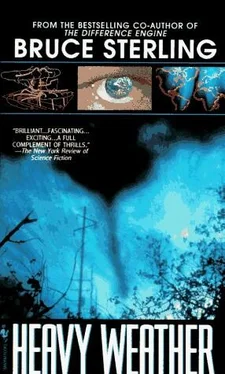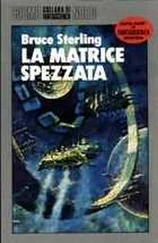Bruce Sterling - Heavy Weather
Здесь есть возможность читать онлайн «Bruce Sterling - Heavy Weather» весь текст электронной книги совершенно бесплатно (целиком полную версию без сокращений). В некоторых случаях можно слушать аудио, скачать через торрент в формате fb2 и присутствует краткое содержание. Жанр: Фантастика и фэнтези, на английском языке. Описание произведения, (предисловие) а так же отзывы посетителей доступны на портале библиотеки ЛибКат.
- Название:Heavy Weather
- Автор:
- Жанр:
- Год:неизвестен
- ISBN:нет данных
- Рейтинг книги:4 / 5. Голосов: 1
-
Избранное:Добавить в избранное
- Отзывы:
-
Ваша оценка:
- 80
- 1
- 2
- 3
- 4
- 5
Heavy Weather: краткое содержание, описание и аннотация
Предлагаем к чтению аннотацию, описание, краткое содержание или предисловие (зависит от того, что написал сам автор книги «Heavy Weather»). Если вы не нашли необходимую информацию о книге — напишите в комментариях, мы постараемся отыскать её.
Heavy Weather — читать онлайн бесплатно полную книгу (весь текст) целиком
Ниже представлен текст книги, разбитый по страницам. Система сохранения места последней прочитанной страницы, позволяет с удобством читать онлайн бесплатно книгу «Heavy Weather», без необходимости каждый раз заново искать на чём Вы остановились. Поставьте закладку, и сможете в любой момент перейти на страницу, на которой закончили чтение.
Интервал:
Закладка:
The people trickling in from all over America-including, of course, Mexico and Canada-were a far different crowd of wannabes than the standard tornado chasers. The standard tornado freak tended to be, at heart, a rather bookish, owlish sort, carefully reading the latest netcasts and polishing his digital binoculars so he could jump out the door and frantically pursue a brief, elusive phenomenon that usually lasted bare minutes.
But the current heavy-weather crowd was a different scene entirely, not the weather people Jane was used to, not the ones she had expected. Even though they were in the heart of the continent and long kilometers from any shore, they were much more like your basic modern hurricane crowd.
Heavy-weather freaks came in a lot of sociological varieties. First, there were a certain number of people who genuinely didn't give a damn about living. People in despair, people actively hunting their own destruction. The overtly suicidal, though a real factor and kind of the heart-and-soul of the phenomenon, were a very small minority. Most of these mournful black-clad Hamlets would suddenly rediscover a strong taste for survival once the wind outside hit a solid, throbbing roar.
Second, and far more numerous, were the rank thrill freaks, the overtanned jocks and precancerous muscular surfer-dude types. It was amazing how few of these reckless idiots would be killed or maimed, by even the worst storms. They usually sported aqualungs and windsurflng smart boards, with which to hunt the Big Wave, the Really Big Wave, the Insanely Big Wave. No surf in Oklahoma, though, so, with the grotesque ingenuity of a leisure industry far gone into deep psychosis, they had brought dozens of mean-ass little diamond-hubbed "wind schooners," sail-powered vehicles so inherently unpredictable that even their onboard computer navigation acted crazy. And yet the sons of bitches who rode the things seemed to bear a charmed life. They were as hard to kill as cockroaches.
Then there were the largest group, the variant people who simply admired and doted on storms. Most of them didn't hack storms. Sometimes they took photos or videos, but they had no intellectual or professional interest. They were simply storm devotees. Some of them were deeply religious. Some wrote really bad net-poetry. Some few of them were very private people, with tattoos and chains and scab art, who would take hallucinogens and/or hold deliberate orgies in bunkers at the height of the troubles. They all tended to have a trademark look of vacant sincerity, and odd fixations in dress and diet.
Fourth, thieves. People on the lookout for the main chance. Looters, black marketeers, rip-off people. Structure-hit people too. Not tremendous numbers, not whole marauding armies of them, but plenty to worry about. They tended to leave mysterious chalk-mark symbols wherever they went, and to share mulligatawny stew in vacant buildings.
And last-the group rising up the charts, and the group that Jane found, basically, by far the least explicable, the creepiest, and the most portentous-evacuation freaks.
People who flourished just after storms. People who liked to dwell in evacuation camps. Perhaps they'd grown up in such a camp during the State of Emergency, and always perversely missed the experience afterward. Or maybe they just enjoyed that feeling of intense, slightly hallucinatory human community that always sprang up in the aftermath of a major natural disaster. Or maybe they just needed disaster to really live, because having grown up under the crushing weight of heavy weather, they had never possessed any real life.
If you had no strong identity of your own, then you could become anyone and everyone, inside an evacuation camp. The annihilation of a town or suburb broke down all barriers of class, status, and experience, and put everyone into the same paper suit. Some people-and growing numbers of them, apparently-actively fed on that situation. They were a new class of human being, something past charlatan, something past fraudster or hustler, something without real precedent, something past history, something past identity. Sometimes-a lot of times-the evacuation freak would be the heart and soul of the local recovery effort, a manic, pink-checked person always cheerful, with a smile for everybody, always ready to console the bereaved, bathe the wounded, play endless games of cot-side charades with the grateful crippled child. Often they passed themselves off as pastors or medical workers or social counselors or minor-league feds of some kind, and they would get away with it too, because no one was checking papers in the horror and pain and confusion.
They would stay as long as they dared, and eat the government chow and wear the paper suits and claim vaguely to be from "somewhere around." Oddly, evacuation freaks were almost always harmless, at least in a physical sense. They didn't steal, they didn't rob, they didn't kill or structure-hit. Some of them were too dazed and confused to do much of anything but sit and eat and smile, but quite often they would work with literally selfless dedication, and inspire the people around them, and the people would look up to them, and admire them, and trust them implicitly, and depend on these hollow people as a community pillar of strength. Evacuation freaks were both men and women. What they were doing was not exactly criminal, and even when caught and scolded or punished for it, they never seemed able to stop. They would just drift to some fresh hell in another state, and rend their garments and cover themselves with mud, and then stagger into camp, faking distress.
But the very weirdest part was that evacuation freaks always seemed to travel entirely alone.
"Juanita," said April Logan, "I always sensed you might p rove to be one of my star students."
"Thank you, April."
"How do you count yourself, in this little social analysis of yours?"
"Me?" Jane said. "Scientist."
"Oh yes"-April nodded slowly-"that's very good."
Jane laughed. "Well, you're here too, you know."
"Of course," April Logan said. Her styled hair lifted a little in the dry, sour breeze, and she gave a long, meditative stare around the Troupe camp, sucking in everything with her flat, yellowish, all-comprehending gaze.
If not for the drought, it would have been a very pretty area. The Troupe was cam~ west of El Reno on Interstate 40, an area of red cliifs of crumbling sandstone, red soil, creek bottoms full of pecans and as p ens and festooned with honeysuckle, a place of goldenrod and winecup and coneflowers and trailing purple legume. Spring hadn't given up yet. It was parched and covered with dust, but spring hadn't given up.
April Logan was wearing a tailored paper jumpsuit printed in gold leaf: a perfectly body-morphed adaptation of one of the more lysergic ornaments from the Book of Kells. It was just like April to wear something like that: costume as oxymoron. Gilded paper. Preindustrial handicraft warped by postindustrial machine, a consumer conundrum from the warring no-man's-land of Cost versus Value versus Worth. And it was, coincidentally, quite beautiful. "I'm still riding the back of the Project," April Logan said. "The Project wanted me to come here, you know."
"You're kidding."
"Oh no," said April. "The Project is sometimes crazy, but it never kids."
Jane had helped to build the Project, as an undergraduate. It was something Professor Logan had been patiently assembling and refining for years-an eldritch chimera of monster clipping service, genetic algorithm, and neural net. A postliterate, neoacademic Correlation Machine, a megachipped Synchronicity Generator. There were a lot of lumps in April's vast analytical stew: demographics, employment records, consumption trends. Geographical distribution of network data trafficking. Mortality rates, flows of private currency. And various arcane indices of graphic design-like April herself, the Project was very big on graphic-design trends.
Читать дальшеИнтервал:
Закладка:
Похожие книги на «Heavy Weather»
Представляем Вашему вниманию похожие книги на «Heavy Weather» списком для выбора. Мы отобрали схожую по названию и смыслу литературу в надежде предоставить читателям больше вариантов отыскать новые, интересные, ещё непрочитанные произведения.
Обсуждение, отзывы о книге «Heavy Weather» и просто собственные мнения читателей. Оставьте ваши комментарии, напишите, что Вы думаете о произведении, его смысле или главных героях. Укажите что конкретно понравилось, а что нет, и почему Вы так считаете.




